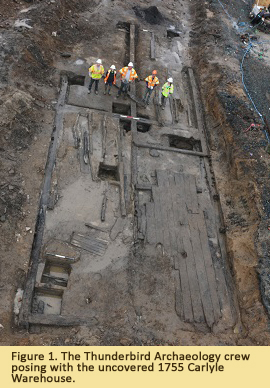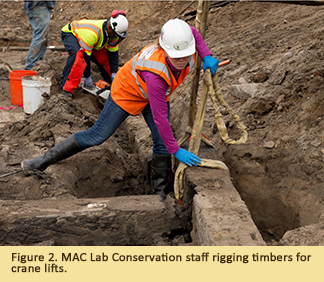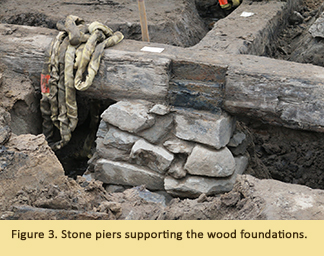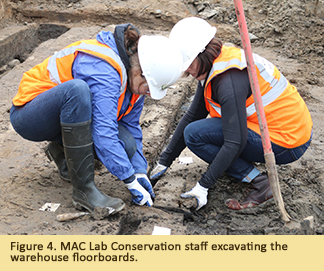Maryland Archaeological Conservation Laboratory
Main_Content
Curator's Choice 2016
Carlyle Warehouse
March 2016
By Nichole Doug, MAC Lab Head Conservator
 Late in September 2015, the first timbers of a large structure began to emerge from the excavation of a site for a hotel on the waterfront of Alexandria, Virginia. Historic documents indicated the presence of a large warehouse, but it was unknown whether the remains of the structure had survived more than two hundred years of urban development. The warehouse was constructed by John Carlyle at the behest of the Trustees of Alexandria in 1755 [Alexandria Archaeology]. This would be the City’s first public works project, when the town was only six years old, and Virginia still a British colony. The Trustees leased the building to merchants and businessmen through the end of the 18th century. It was in this warehouse that Andrew Wales started the town’s first brewery.
Late in September 2015, the first timbers of a large structure began to emerge from the excavation of a site for a hotel on the waterfront of Alexandria, Virginia. Historic documents indicated the presence of a large warehouse, but it was unknown whether the remains of the structure had survived more than two hundred years of urban development. The warehouse was constructed by John Carlyle at the behest of the Trustees of Alexandria in 1755 [Alexandria Archaeology]. This would be the City’s first public works project, when the town was only six years old, and Virginia still a British colony. The Trustees leased the building to merchants and businessmen through the end of the 18th century. It was in this warehouse that Andrew Wales started the town’s first brewery.
John Carlyle was a well-known figure in Alexandria’s history. A Scottish merchant, he ran many businesses including an import and export trade, retail, an iron foundry, mill and blacksmith shop. As a prominent citizen of Northern Virginia, he served as one of the original trustees of Alexandria, commissary for the Virginia militia during the French and Indian War and the Revolutionary War, and justice of the peace for Fairfax County [Spencer 1910, Carlyle House Park]. The waterfront warehouse is only one of several buildings attributed to John Carlyle and that bear his name still.
The Carlyle Warehouse is the earliest historic structure archaeologically excavated in Alexandria to date. The preservation of the wood frame foundation exceeded all expectations. The large beams were supported by stone piers and connected with mortise and tenon joints as well as dowelled lap and finger joints. In addition to the foundation, floor boards and sections of collapsed wall and ceiling framing were also preserved. The overall dimensions of the structure measured 24 feet wide by 90 feet  long. Only the eastern-most section of the structure’s foundation was destroyed by previous development activity. Barrels, glass bottles and tools associated with the building were recovered. Other remains on the site included house foundations, a brick-lined well, three privies and a fragment of a large ship.
long. Only the eastern-most section of the structure’s foundation was destroyed by previous development activity. Barrels, glass bottles and tools associated with the building were recovered. Other remains on the site included house foundations, a brick-lined well, three privies and a fragment of a large ship.
Following thorough documentation of the site, the building timbers were systematically labelled and removed to the Maryland Archaeological Conservation Laboratory for conservation in November 2015. Over the next several years, the oak timbers will be impregnated with a stabilizing agent to prevent the wood from cracking and warping once dry. The Lab staff will make use of a vacuum freeze dryer to control the drying process and preserve all the dimensional information still available in the wood. This includes historic carpenter’s markings in the form of Roman numerals, as well as tool marks and evidence of how the building was constructed. At this time, there are no definitive plans for long term exhibit.

